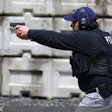I once knew a firearms instructor who'd been to "instructor school" about 20 years before, and was perfectly happy to keep teaching what he learned back then. He was not interested in going to more instructor schools, and he wasn't really interested in discussing new training techniques or information. As far as he was concerned, he was already "certified" as an instructor, and that was that.
I also knew a defensive tactics guy who was actually a martial artist of some repute. In his discipline, he excelled at what he did. He had taken a few "moves" and taught them to officers, and as far as he was concerned, that made him a defensive tactics trainer.
Then there was the guy who…well, you get the idea.
So, do we really not need firearms instructors anymore? Of course we do. We need them more than ever. What we don't need are firearms instructors—or any other instructors—that aren't interested in staying current, or don't want to be cross-trained in other high-risk disciplines. What we need are Force and Control Instructors.
Cross Training: Keeping things in Context
There was a time when we could have a firearms instructor and a defensive tactics (DT) instructor, and maybe even a driving instructor, and they could all teach their respective disciplines, and everything would be fine. Stop me if you've ever heard this one: "All the stuff you learn in your other classes is important, but firearms (or DT or driving, or whatever) is the most important class you'll have." I heard that from several different instructors back in the academy, and even though we were training with flintlock pistols back then, that train of thought stuck with many law enforcement instructors for many years.
In this day and age, that just won't fly. High-risk incidents are dynamic, and officers need training that will equip them to flow smoothly and coherently from one activity to the next, maintaining the contextual linkages between events.
So the traffic stop that turns into a pursuit that turns into a felony stop that turns into a cuff and search procedure is really one event, one that occurs in a multi-phased fashion. That's complicated, and it's made more so when the training that officers get is broken up into separate and distinct chunks, each of which fails to segue smoothly into the next activity.
Because many trainers are recognizing this fact, more and more departments are conducting force-on-force role play scenarios, with scripting and desired outcomes. That's a good thing, and we need more of it.
"But that's expensive and slow," goes the argument, "we can't afford to do that. It takes too much time." So some departments stick with the same format for training they have always had, dozens or scores of repetitions of static drills, given to learn one specific move or method, without context. The question is, is that really the learning model that is most beneficial?
Along this same line, it's not enough for instructors to rely on the "legal instructor" to teach the underlying rationale for the use of force and control. Every trainer that teaches a high-risk discipline—be it firearms, driving, or DT—needs a full and accurate understanding of the legal theory behind forcible control by the police. That material must be interwoven into whatever training officers receive, so that it becomes an integral part of their in-depth understanding of the subject.
When a department wants to take the leap into contextual training, it will need cross-trained instructors. Or at least instructors who are sufficiently trained in other disciplines so that they can put together contextually sound training scenarios, and do so safely and efficiently.
It is therefore incumbent upon instructors to get the training they need to fit this new model, so that their officers will get the best, most job-related training they can deliver. There will always be a need for training in the basic skills of policing, and there is no substitute for traditional methods in that regard. But when we move the "slider" along the continuum from "comfortable, static, and easy" toward "job-related, court-defensible, and contextually valid," we're going to need trainers that have grown beyond their individual disciplines. We're going to need Force and Control Instructors.













